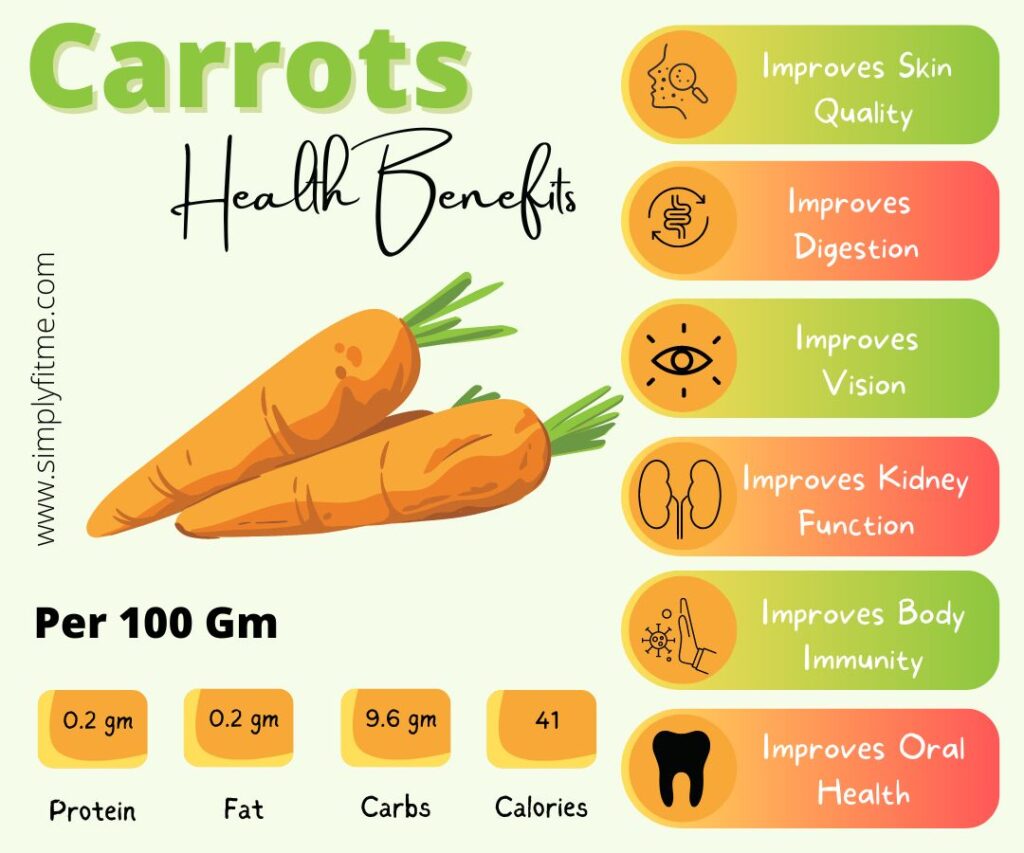Fresh juicy and crunchy carrots are relished by everyone. This veggie is packed with nutrients like vitamin A, vitamin K and potassium. It’s highly nutritious in nature. The nutrition facts of carrots help to meet the daily requirement of vitamins and fibre. Carrots are one of the roots vegetables which are low in carbohydrates which makes them ideal for weight loss. They have many health benefits as they are packed with Beta carotene which supports heart and eye health. Read also: Black beans Nutritional Facts & Health Benefits
Nutritive value of carrots for 100 grams
- Calories: 41k.calories
- Water: 88%
- Protein: 0.9 grams
- Carbohydrates: 9.6 grams
- Sugar: 4.7 grams
- Fibre: 2.8 grams
- Fat: 0.2 grams
- Water content?: 85 to 95%
Carbohydrate content
The carbs content is low and it’s packed with natural sugars such as sucrose and glucose in it. They are a good source of fibre and are low in glycaemic index. The glycaemic index for boiled carrots ranges from 35 to 45. When low GI foods are consumed blood sugar remains normal along with other health benefits.
Fibre content
The form of soluble fibres present in carrots is pectin. The role of soluble fibres is to slow down the digestive process through which food remains in the stomach for longer time periods. It greatly helps in reducing cholesterol as well as inhibits the absorption of cholesterol from the digestive tract. Apart from soluble fibres other insoluble fibres which are present are cellulose, hemicellulose and lignin.
Vitamins and minerals
Carrots are rich in many vitamins and minerals such as biotin, potassium and other B vitamins.
Vitamin A
Beta-carotene is the inactive form of vitamin A which is converted to vitamin A in the body. Vitamin A is responsible for vision, growth and even the immune system.
Biotin
Biotin also has a key role in providing good skin and hair. Its formerly known as vitamin H. The nutrition facts of carrots help to meet the daily requirement of vitamins and fibre.
Vitamin K1
This vitamin is responsible for blood coagulation and bone health. Its also known as phylloquinone.
Potassium
It’s an important mineral in the body’s metabolic process and helps in maintaining an osmotic balance of the body. It promotes bone health too.
Other plant compounds in carrots
Many plant compounds such as carotenoids, lutein and zeaxanthin are present in carrots which helps to alter many processes. However, the main plant compounds are Read also: How Psyllium Husk Will Help You Lose Weight
1. Beta carotene
Among the different colours of carrots, orange carrots are high in Beta carotene. If the carrots are cooked the absorption is better. The nutrition facts of carrots help to meet the daily requirement of vitamins and fibre.
2. Alpha-carotene
It’s an antioxidant just like Beta carotene which is partly converted to vitamin a in the body.
3. Lutein
Lutein is found in yellow and orange carrots and it’s very important for eye health. It’s the most common antioxidant which is found.
4. Lycopene
This antioxidant is found in red and purple coloured fruits and vegetables. It’s bright red in colour. Tomatoes are an abundant source of lycopene. The role of lycopene is to reduce the risk of cancer and heart diseases.
5. Polyacetylenes
Polyacetylenes are a group of bioactive compounds which are found in carrots. They help to protect against leukaemia and another type of cancers. The nutrition facts of carrots help to meet the daily requirement of vitamins and fibre.
6. Anthocyanins
They are powerful antioxidants which are found in dark-coloured carrots and vegetables.
Health benefits of carrots

Carrots are rich in vitamins, minerals and other antioxidants which provide many health benefits. Antioxidants are present in plant-based foods. They help the body to remove free radicals if they get accumulated in the body in large amounts. Read also: 12 Super foods to Add Your Diet To Stay Healthy
1. Vision
As discussed carrots are rich in vitamin A. as vitamin A has many functions its deficiency can even lead to many health problems. Xeropthalmia is a deficiency caused by vitamin A which is an eye disease. In xeropthalmia, the person faces difficulty in vision if the levels of light are too low. If untreated it can cause night blindness. Carrots also contain an antioxidant named zeaxanthin and lutein. They are responsible for preventing macular degeneration due to age. It’s even a kind of vision loss. The deficiency of vitamin A can be corrected with the intake of carrots in the diet.
2. Cancer
When too many free radicals accumulate in the body it increases the chances of causing cancer. Different pigments which are present in different colours of carrots help to reduce the risk. The two examples of antioxidants are lutein and zeaxanthin help greatly reduce the risk.
3. Digestive Health
Consumption of carrots helps to meet 5 to 7% of daily needs of fibre, depending on age and sex. When adequate fibre is taken into the diet it helps to keep the digestive system healthy. A high fibre intake diet lowers the risk of colorectal cancer in the body and maintains gut health.
4. Diabetes control
Although carrots are a root vegetable the carbs content make up around 10% of the weight of carrot. Both boiled and raw carrots have a low glycaemic index score. That means they don’t spike blood sugar levels very quickly. This makes carrots an ideal consumption for those who have diabetes.
5. Blood pressure and cardiovascular health
According to American Heart Association, people should opt for foods which are low in sodium and high in potassium. Carrots are a good source of potassium. The role of potassium Is to relax blood vessels which reduce the risk of high blood pressure and cardiovascular diseases. Daily consumption of one carrot meets around 4% of the potassium requirement. When such foods are taken into the diet risk of bad cholesterol can also be eliminated from the body. Read also: Blueberries Nutritional Facts & Weight Loss
6. Immune function
Apart from all, vitamin C is also an antioxidant which is present in carrots. It helps to maintain the immune system. When dirt adequate in vitamin C is taken it helps to fight against infections and boosts the immune system. Apart from vitamin C, vitamin A also has a role in the immune system.
7. Bone health and healing
Carrots contain vitamin K and small amounts of calcium and phosphorus. All of them contribute to bone health and prevent osteoporosis. Vitamin C contributes to collagen production. Collagen is essential for wound healing and keeps the body healthy too.
8. Weight loss
Since carrots are very low in calories, it makes them an ideal food for weight loss. It helps to increase the fullness which decreases appetite. Low appetite leads to less consumption of calories which leads to weight loss. Different ways can be included such as carrot juice, carrot smoothie, and carrot salad. It can be also incorporated with hummus and other healthy dressings.
Tips for preparing carrots
The carrot is a versatile vegetable. It can be eaten in many forms such as raw, steamed, boiled, or roasted. It’s great to be added to soups and stews. However, when carrots are boiled their nutrition content is reduced as vitamins get lost. Raw and steamed carrots provide the most nutritional value. Read also: Pumpkin Nutritional Facts & Weight Loss
Organic vs conventionally grown carrots
In organic farming, the use of harmful pesticides is reduced to much extent and it’s grown with natural methods. When studies were compared there was no such difference between organic and conventionally grown carrots. Even there was not much difference in carotenoids and the antioxidant content and quality.
When talking about conventionally grown carrots they contain pesticide residues. Long-term consumption of pesticides on health effects is unclear.
Risks of carrots
If too many carrots are consumed then it can make the skin turn into orange and yellow colour as they are rich in beta carotenes. Such a condition is known as carotenemia. No matter it’s harmless and can be treated. But in rare cases, it becomes extreme and it can affect bones, skin, metabolism and immune system.
For those who have hypothyroidism, it can be problematic for them as too much Beta carotene will not be converted to vitamin A. some people will also experience itchiness in the mouth after eating carrots this is called oral allergy syndrome. This can be avoided if cooked carrots are consumed. The allergy happens when proteins in it react to the pollens that you are allergic to.
Carrots have various antioxidants in them which helps to protect the body against various harmful free radicals. The role of antioxidants is to decrease the risk of high blood pressure, heart diseases and various other cancers. As carrots are high in fibre it helps to keep bowel movements in the tract and prevents constipation too.
The carbohydrates which are present In carrots are sucrose and glucose. It is also composed of water as well. Its also composed of fibre which is good for the body. The nutrition facts of carrots help to meet the daily requirement of vitamins and fibre.







